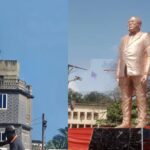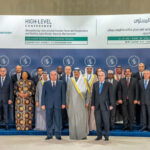
Parliament of Ghana
Parliament yesterday approved the 2023 Budget Statement and Economic Policy of the government.
It was adopted through a voice vote, which was put to the House by the Speaker, Mr. Alban Sumana Kingsford Bagbin.
This was after the two leaders of the House, Mr. Osei Kyei-Mensah-Bonsu of the Majority side and Mr. Haruna Iddrisu from the Minority caucus, made their statements to conclude the debate, which commenced on Tuesday, November 29.
It would be recalled that the Finance Minister, Mr. Ken Ofori-Atta, on behalf of the President, Akufo-Addo, presented the Budget Statement to Parliament on November 24, 2022.
This was in accordance with Article 179 of the 1992 constitution and Section 21 of the Public Financial Management Act, 2016. Parliaments Standing Order 140 (2) also enjoins the Minister responsible for Finance to present the Budget Statement on behalf of the President.
The Order states: “The Budget shall be presented to the House by the Minister responsible for Finance on behalf of or on the authority of the President and in such form as the House may determine.”
Clause 3 of the same order then enjoins Parliament to debate the budget before approval.
Clause 3 states, “Whenever a motion …That this House approves the financial policy of the Government for the year ending ………………………………………………….. 19 ………….” has been moved by the Minister responsible for Finance, the debate on it shall stand adjourned for not less than three days.”
The aforementioned Articles, Orders and Acts culminated into the presentation of the budget, debate and subsequent approval. It, however, didn’t get the House’s approval without strong comments from the two leaders.
Minority Leaders argument
Although the Minority Leader expressed his support for the budget while concluding his debate, he indicated that the budget is not a reflection of a government that is managing the economy well, as promised during the 2016 elections.
Mr. Iddrisu said the New Patriotic Party (NPP) in its 2016 manifesto promised to move the people of Ghana from taxation to production, but it is now doing the opposite.
He noted that the budget is inundated with about 24 taxes, which he said will only worsen the economic hardships that the citizens are facing at the moment.
“Mr Speaker, before they assumed the reins of power in 2017… They said that when they come, they will manage this economy well.
“Mr Speaker, in their 2016 manifesto, the headline was from taxation to production [but] today [it is] from production to taxation. Talk is cheap…In this budget, Mr. Speaker, the government is introducing 24 taxes,” Mr. Iddrisu indicated.
Speaking specifically about the introduction of the 2.5% VAT, Mr. Iddrisu indicated to the House that the Minority will resist its introduction.
According to the Tamale South legislator, the tax will have a toll on the finances of the business community.
“Mr Speaker, without going further, we in the NDC Minority group will fiercely resist the imposition of this additional tax on Ghanaians and Ghanaian business…”.
He said that government should rather go and cut expenditure from government machinery in order to raise the revenue that it wants to generate from the introduction of the VAT and not burden Ghanaians with additional taxes. ”
So go back to your office of government machinery and then reduce the tax rate there,” the Minority leader said.
Majority Leaders submission
Mr. Kyei-Mensah-Bonsu commenced his debate by responding to some comments made by the Minority Leader. According to Mr Kyei-Mensah-Bonsu, the notion that the National Democratic Congress (NDC) were better managers of the economy is not true, because the NDC wouldn’t have survived if it went through the crisis that the NPP government is going through.
He said the economic crisis facing the country is as a result of the two global disasters witnessed all over the world -COVID-19 and the Russia and Ukraine war- and touted his party as good managers of the economy.
Touching on the introduction of the 2.5% VAT, the Suame legislator said there was the need to continue the building of roads in the country, hence the introduction of the new rate.
He indicated that about 25% of the questions that are asked in the chamber are all related to roads, which is an indication that the sector must be tackled with all seriousness it deserves.
“…So the 2.5% increase in the VAT, primarily it is going to be used for road construction. If you don’t want your roads to be constructed tell us that you don’t want your roads to be constructed,” he said.
It should be noted that the Minister for Finance was in the Chamber when the debate and the approval took place.
The post Majority, Minority joyfully approve Budget appeared first on The Chronicle News Online.
Chronicle




